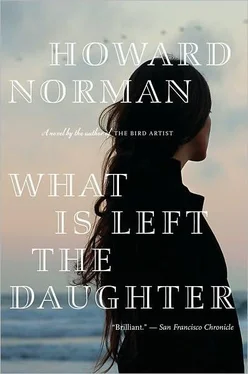But you know what, Marlais? Unless Lenore Teachout had been on the third-party line at the Homestead, pen and paper in hand, and later provided me with transcripts, it's otherwise impossible for me to remember all of the conversations — dozens — that I had with Reese Mac Isaac over the next six or seven months.
I can assure you, however, that for a long time we never spoke face-to-face. If we saw each other in the lobby, we allowed for only the slightest acknowledgment. Hello, a half-smile, sometimes not even that. A few days would go by, no conversation, then we might talk for upward of an hour, depending on whether other people in the hotel required Reese's services. But there was one conversation I definitely want to tell you about, and here goes.
Simply put, I was sick and tired of not knowing — not knowing and not knowing — very much about the day my parents jumped from those bridges. So one night at about ten P.M. I said, "Reese, did you speak with my mother or my father on the morning before they died?"
I suppose it's to her credit that Reese didn't hesitate to answer. I was grateful for that. "Not that morning, no," she said. "The night before, I did speak with Katherine, but not with Joe. I was going to spend time with Joe the next night, but there wasn't a next night."
"No, there wasn't," I said.
"Wyatt, do you want to know what Katherine and I spoke about?"
"It would allow me to stop tormenting myself wondering."
"Well, Katherine was in a philosophical way. We talked about the impossibility of life. No, that's not quite it. More to the point, we talked about the impossibility of us. " Reese stopped, seeming to collect herself. Then: "I'm just going to say this, all right, Wyatt?"
"Just say it."
"The impossibility of us having a love. A love for each other. I mean physical, Wyatt. And I mean all other aspects, too. Oh, how we could talk with each other. Especially about theater and movies, I suppose. But about most anything, really. We spoke about — forgive me — her marriage. Your father seldom spoke about the marriage. Then again, he didn't cry wolf, either. If he did say something, he'd already given it some thought. About the thing itself, and if he should tell me. And he never once — not once — directed a harsh word toward Katherine. Joseph was discreet like that.
"As I said, Katherine was in a philosophical mood that night. We spoke about the impossibility of a person fitting a secret life within the life they already have. Wanting desperately to hang on to that secret life, because it's the life that touches you the deepest. Believe me, Wyatt, she suffered real anguish, because her secret life touched her deepest. This can't be easy to hear, but you asked."
"Of course, you had two secret lives, didn't you, Reese," I said.
"Yes, and they had the same address, didn't they," Reese said. "Right next door."
"Three times as lonely, I bet."
"It wasn't mathematics, Wyatt."
"Did you talk a long time with my mother that night?"
"Through two pots of tea and some other things to drink," Reese said. "It was Joe's night to have his typewriter shop open late. So we talked and talked, Katherine and I. It's common wisdom, but a rare actual experience in life, that if you find someone you can truly talk with, you can love that person. We declared certain things to each other. No promises were made, but anguished declarations were stated. And what tears me apart every night of my life is that I'm convinced late that night Katherine confessed everything to Joseph. She was so much at wits' end. What's more, I'm equally convinced that Joseph then confessed everything to Katherine.
"They were two good people in a terrible situation." Reese cried a little, then said, "Sorry."
"No need to apologize," I said.
"Well, there is a need," she said. "But I don't know. I just don't know. I don't know what they said to each other. And the truth is, I heard about the bridges the same way everyone else did. On the radio."
I set down the telephone on its cradle. But Reese rang me right back.
"You asked me a question, Wyatt," she said. "Now I have one to ask you. Am I correct in thinking you hold a poisonous grudge against me? That's my question. Do you hate me because you believe Katherine and Joe jumping off those bridges was somehow my fault?"
"And what would it matter to you if I did hate you?"
"I don't expect sympathy. I don't deserve it. But I've gotten a lot of nasty letters — unsigned, by the way, a lot of them. Good Christian judgments, but they don't sign their letters."
"Sounds bad."
"Just please answer my question."
"I hated you and hated what my parents did. But no longer. Let's leave it at that."
"All right. That's something at least. Thank you."
"Ten thousand Haligonians reading about it. How was I supposed to get any peace about what happened? I still don't know how to find any peace about it."
"In my own small way I was happy for you, Wyatt, that your aunt and uncle took you in. That you didn't get hounded."
"It's not like life didn't have other things in store."
"Yes, I know. I read the newspapers. The murder of that German student was on page two. And there was your uncle's name. There was your name. And I thought, My God, that's Katherine and Joe's boy."
And that was the third-to-last time I spoke with Reese Mac Isaac.
The second-to-last took place on the evening of November 9, 1962. Halifax had recently experienced one of the nastiest storms in memory. It lasted a good three days. Gale-force winds, hail, rain and sleet. There had even been bulletins warning of water spouts — water spouts were bad news, and I recall being told that in 1940, a member of the gaffing crew, Paul Syberg, was a victim of a water spout, which more or less ambushed a tugboat he'd been working on. It whirlpooled, flung him overboard and nearly capsized the tug.
On one of the relatively calm days during the November storm, my crew took the opportunity to get some gaffing done — taking precautions, of course — and Hermione Rexroth and I had been assigned to the waters close by Pier 21. The Cascania was tied up at the pier. Hermione commented on just how high up on the Cascamos hull the waves had pasted slick ribbons of kelp.
In her spare time — she wasn't married — Hermione was something of an historian of Pier 21 and of immigration in general. "The harshest thing, to my mind," she had once said to me, "the most shameful? It was a long time before Jewish displaced persons — refugees, orphans, all that — were welcomed to Canada. Here we fought the war, Canada did, but the government wouldn't take in the people who had it worst. Well, the War Orphans Project — what, 1947, thereabouts? That allowed Jews in — if I have my numbers right, between 1947 and 1949, about eleven hundred Jewish orphans and fifteen thousand Jewish refugees were allowed in."
"That's all good deeds there," I said.
"Finally — sure," she said. "But it was late. Very, very late, Wyatt. Besides, Halifax wasn't all saints in other ways, too. If you go up to the sporting club, corner of Gottingen and Gerrish? You'll find JEWS NOT ALLOWED stenciled by the front gate. Sure, they've since scrubbed it. But look closely — it's legible. Same for the public swimming pool, Northpark and Cornwallis."
"Jesus, look right now at all those people on the gangway," I said.
"All Hungarians, according to the newspaper," Hermione said.
"And listen to the bagpipes," I said. "Rain or shine for how many years now? A piper's always there to greet every ship."
"I'd bet that those Hungarians, for better or worse, have never heard bagpipes before."
I couldn't figure out the reason, but all that day I'd battled a terrible headache, sometimes to the point of blurred vision. And late one afternoon, I threw up my hands to fend off what I thought was a seagull, but it wasn't anything. With that incident, I should've called it a day. Instead, I said, "Hermione, let's take an hour break, all right?" We rowed over and tied up to a tug that had escorted the Cascania, climbed the ladder on deck and had hot tea with the four-man crew, fellows we knew well, and it was a blessed reprieve from the biting cold. From the wheelhouse, all of us watched immigrants — suitcases in hand, children alongside, sleet sticking to hats and scarves — move slowly down the gangway. It must've been the headache having its strangest effect of all, plus the sleet somewhat obscuring the view, the steam out of the tug's galley pipe, too — I don't know what all — but, Marlais, I thought I saw your mother moving slowly along the gangway, and a girl of about sixteen, which would've been your age at the time, was huddled against her.
Читать дальше












